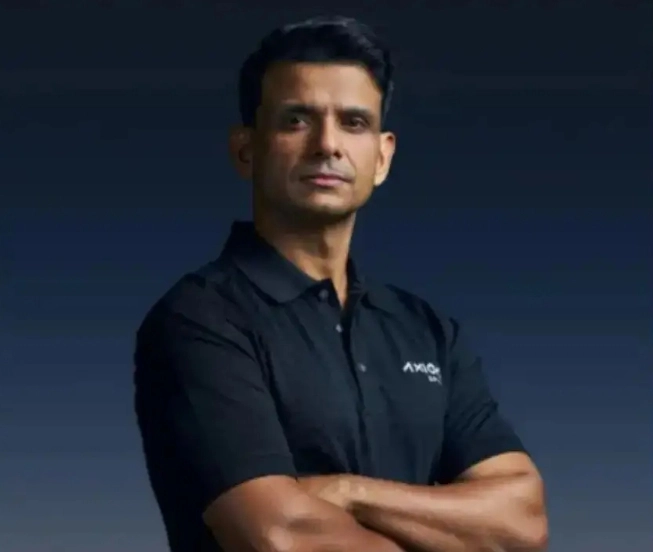India's Shubhanshu Shukla Set to Travel to International Space Station on May 29, to Conduct 7 Experiments Developed by ISRO

Indian
astronaut Group Captain
Shubhanshu Shukla is scheduled to fly to the International Space Station (
ISS) on May 29 as part of Axiom Space’s fourth commercial mission. Shukla will fly aboard a Spacex Dragon spacecraft, becoming the first Indian to reach the ISS and the first Indian in space since Rakesh Sharma's historic 1984 mission aboard a Soviet Soyuz spacecraft.
The Axe-4 mission lifted off at 10:33 PM IST from NASA’s Kennedy Space Centre in Florida. The announcement was made by US-based Axiom Space during a virtual press conference Tuesday evening.
The Ax-4 crew includes astronauts from Poland and Hungary, both marking their countries’ first missions to the ISS and their second-ever human spaceflights in over 40 years. European Space Agency astronaut Slawosz Uznanski will be the second Polish astronaut since 1978, and Tibor Kapu will become Hungary’s second astronaut since 1980.
Veteran NASA astronaut Peggy Whitson will command the mission. Whitson currently holds the US record for the most cumulative time spent in space.
ISRO Plans on 7 Scientific Experiments in Space
During the mission, Shukla is set to conduct seven scientific experiments developed by the Indian Space Research Organisation (ISRO), focused on microgravity research. These studies are part of India’s broader ambitions to establish a space station by 2035 and send astronauts to the Moon by 2047.
One of the key experiments involves studying the sprouting of India-specific seeds, such as moong (green gram) and methi (fenugreek), in space.
"We have a sprouting experiment which tries to sprout green gram or moong and methi or fenugreek seeds, which are believed to have medicinal properties," said Tushar Phadnis, Group Head for Microgravity Platforms and Research at Axiom, as quoted by PTI.
"The idea is not just to stop with sprouting it there. The idea is also to see how these India-specific sprouts behave when they come back. They will undergo a lot of analysis in the labs of the respective PIS (principal investigators)," he said.
Phadnis added that the seeds will be exposed to space conditions and studied further once back on Earth. "And when they're brought back to Earth, they'll be cultivated in plants not just once but over generations," he said.
Overall, the Axe-4 mission will carry out around 60 scientific investigations, including the seven experiments from India. The crew is expected to spend up to 14 days aboard the space station.
Earlier on April 18, after a high-level meeting held with ISRO, Union Minister of State (Independent Charge) for Science and Technology Jitendra Singh had announced that India was "ready for its next space milestone".
The government in a statement had said, “Group Captain Shukla’s mission, scheduled for May 2025, marks a milestone in India’s expanding international space collaborations. A decorated test pilot with the Indian Air Force, he was shortlisted under ISRO’s Human Spaceflight Program (HSP) and is among the top contenders for the Gaganyaan mission, India’s first indigenous crewed orbital flight. His journey aboard the Axe-44 mission is expected to provide critical hands-on experience in spaceflight operations, launch protocols, microgravity adaptation, and emergency preparedness — all essential for India’s crewed space ambitions.”
"What sets Shukla’s mission apart is its strategic importance. Unlike the symbolic undertones of India’s first human spaceflight, this time the focus is on operational readiness and global integration. His participation underscores India’s growing engagement with public-private international partnerships in space and its resolve to emerge as a serious contender in human space exploration," it had added.
 Indian astronaut Group Captain Shubhanshu Shukla is scheduled to fly to the International Space Station (ISS) on May 29 as part of Axiom Space’s fourth commercial mission. Shukla will fly aboard a Spacex Dragon spacecraft, becoming the first Indian to reach the ISS and the first Indian in space since Rakesh Sharma's historic 1984 mission aboard a Soviet Soyuz spacecraft.
Indian astronaut Group Captain Shubhanshu Shukla is scheduled to fly to the International Space Station (ISS) on May 29 as part of Axiom Space’s fourth commercial mission. Shukla will fly aboard a Spacex Dragon spacecraft, becoming the first Indian to reach the ISS and the first Indian in space since Rakesh Sharma's historic 1984 mission aboard a Soviet Soyuz spacecraft.